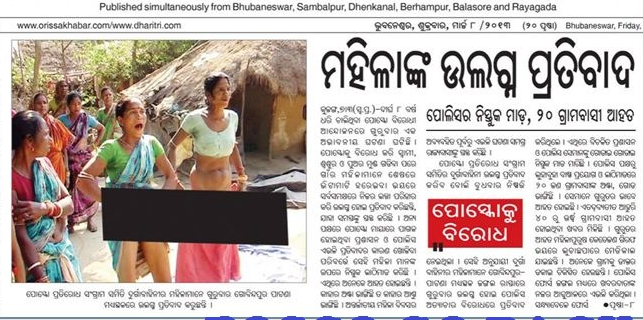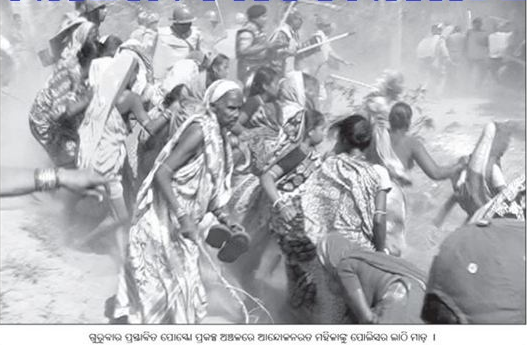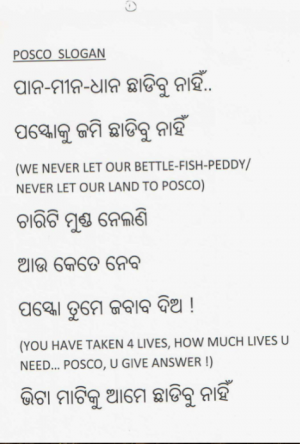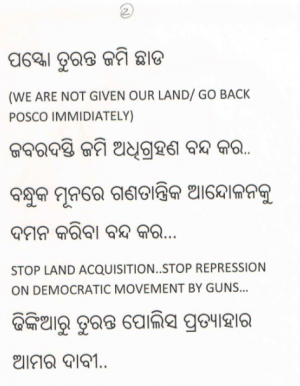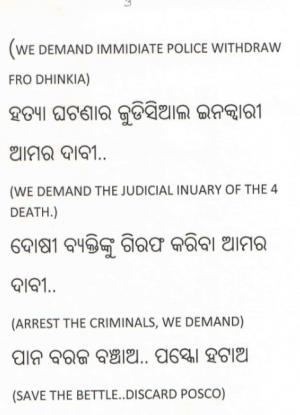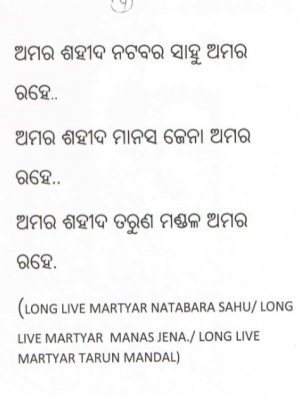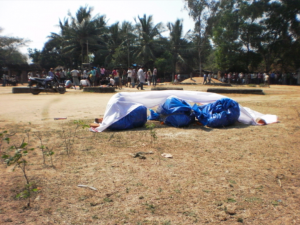
On the evening of Saturday March 2nd three village activists opposing Korean steel company POSCO’s mega-steel project in Odisha were killed by a bomb thrown by pro-POSCO goondas. Police later gave statements to the media claiming that the three activists were in fact making a bomb which exploded and killed them. This version of events has been carried by the Indian newspapers and TV. Following the killings the district administration put prohibitory orders on the whole Patna area, trying to prevent villagers and activists from meeting to arrange rallies objecting to the murders. Meanwhile the land acquisition was ramped up as local officials used the prohibition to push through land grabbing without the usual activist opposition. According to one report 22 betel vine plantations had already been destroyed by Tuesday 5th March.
Despite this enormous repression 3000 villagers and supporters gathered on Wednesday 6th March to cremate the bodies of the martyrs and protest against the brutality of POSCO and the state police, who have worked hand in glove with the company, and stated louder than ever that POSCO’s project will not be allowed on their land. Brutal repression at the protests led to 40 women being injured in baton charges and 20 more seriously injured. Pictures of the event and some of their slogans in Odiya and English are pictured here.
Foil Vedanta joins with social movements around the world in condemning the Odisha State Government and POSCO for these brutal murders and demands the removal of all police forces and company goondas from the Govindapur area immediately, and a final stop to this despicable project which has already cost so many lives. This so-called ‘development’ is not wanted by those it is being pushed upon.
This is a report based on front-line reports and pictures from our activist friends, and interviews with the families of the martyred victims posted on the Samadrusti youtube stream.
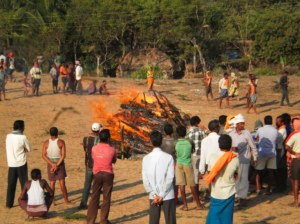
The $12 billion POSCO steel project and Vedanta’s proposed Niyamgiri bauxite mine have been two of the most contentious projects in Odisha, and indeed in India, in recent years, with iconic and strong social movements opposing them. However, perhaps due to the lower level of international attention, the POSCO movement has been even more violently repressed. The police, state agencies and the company goondas have repeatedly attacked villagers, made false arrests, burned houses, abused women and killed local activists. Several of the villages in Govindapur are under constant police occupation. In February this year the villages were stormed by armed police on a Sunday night and villagers were beaten and abused. POSCO is yet to get Environmental Clearance, mining lease, water source allocation, renewal of lease or settlement of claims under the Forest Rights Act, yet – hand in hand with the state government it continues to grab land and harass villagers. But none of this has been enough to deter the defiant villagers.
On March 2nd 2013 in Patna village, Dhinkia, Odisha a group of activists were taking refuge in the house of a fellow activist after being hunted by police forces for three days for their anti-company activities. Suddenly an explosion was heard and some went out to see what it was. Another bomb was thrown at them and four people were critically injured. Three dies soon after from their injuries while the fourth was able to get to hospital and his life saved. They were Manas Jena, Nabin Mondal (brother of Dula Mondal who was also recently killed) and Narahari Sahu – three key activists against the POSCO plant which threatened their land and families. Nabin Mondal had recently filed an FIR against IDCO officer Sangram Mohapatra for another violent attack on the village on Feb 3rd 2013. Laxman Paramanik who was taken to hospital has so far survived but is battling for his life.
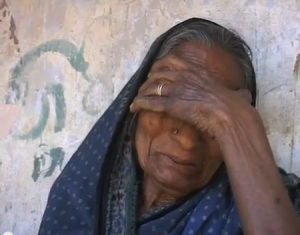
Abhay Sahu, President of the POSCO Pratirodh Sangram Samiti (PPSS) – the main movement opposing the project – who was also in the house at the time of the bombing was interviewed shortly after the event. He explained how some villagers had gone to protest the illegal road construction taking place and there had been heated arguments with the police and heavy police forces deployed. Because of this the victims had gone to the house to rest and find safety. He said:
“Suddenly there was bomb attack from behind from the jungle side. They went out to know the truth but became the victims of the attack and were critically injured. We immediately informed the police but they did not bother. We could have saved three. We somehow managed to send the fourth one to a hospital and saved him. Even then the police did not come. SP and Collector reached the spot 15 hours after the incident took place and started giving irresponsible statements which is their habitual practice.”
In a public statement PPSS Spokesperson Prashant Paikaray expands:
“The pro-posco goons could do this barbaric act and escape because it was dark and the police probably helped them to escape as they were present on all sides of exit gates. Despite our request immediately after the incident, the police did not come and did not send the ambulance which could have saved at least two lives. The police reached the spot 15 hours after the bombing took place, though their camp is located 2 minutes away from the place and though they were patrolling day and night on all sides. But without reaching the spot and investigating the facts, the SP and district administration based at Jagatsinghpur i.e. more than 30 kms away from the place were seen to be active in calling the media immediately after bombing in which deliberate attempts were made to mislead the public about the incidence. They were initially successful too.”
Many commentators have challenged the claims of the police and media that the activists were making bombs. They have pointed out that in eight years of struggle the movement has always been peaceful, that the men accused didn’t even know how to use a knife and that bomb making equipment would be impossible to get into the village. In his interview PPSS President Abhay Sahu appeals to the public to know the truth:
“All concerned citizens of the Country – please come and do independent investigation to know the truth. No single evidence in the media suggests any act of violence done by the agitators in the past. There is no instance of protesters getting armed or assaulting the police/pro-POSCO elements. All the acts of violence have been done by THEM: Attack by Sangram Mohapatra (Idco officer) on villagers, atrocities, firing, setting houses on fire, raiding houses – all these have been done by police. They are searching every house in Govindapur in the presence of administration. Heavy deployment of police has helped the pro-POSCO elements go mad and do crimes like this bombing.”
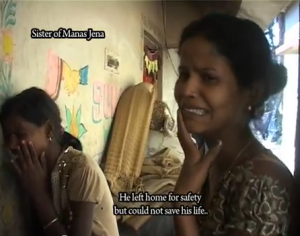
The sister of Manas Jena also gave a very moving interview, in tears of sadness, rage and disgust at the death of her brother:
“They were in search of a safe place for last five days. Last year they also injured many while they were sleeping, and they said they were fighting with each other. He left home for safety but could not save his life. They killed him by bombing. Now they say he died while making a bomb. Had he wanted to make a bomb and kill people he would have done it long back.
How many more you want to kill for pleasure? Many homes are devastated. How many more do you want? What will we do with your money? Can money replace human love and care? Anyone who resisted got killed. No-one is willing to talk now. Village is under police occupation. Everybody is tortured.”
Another villager of Govindapur also spoke out:
“They have filed several cases against protesters. Land acquisition will only be possible if they arrest them. House to house search is on. Even today they entered the house of Khira Das and misbehaved with his children. This is going on. We can’t return to our village. Police are there all around. Last night we were not there in the village. Did not eat anything. Police were there.”
The police have refused to accept the FIR on the killing filed by family members of the victims, but they did accept an FIR against the victims and survivors including PPSS leader Abhay Sahu on false charges of conspiracy. PPSS’s public statement claims that Odisha chief minister Naveen Patnaik and his Chief Secretary Bijoy Pattnaik have endorsed, and are personally monitoring this repression. But the movement are defiant that they will not be silenced even by murder of their people, as female PPSS activist Manorama states in the film:
“The blood stained soil will inspire many more children of the village. They and their mothers and sisters will take a pledge to protect this soil. POSCO will never become a reality here.”
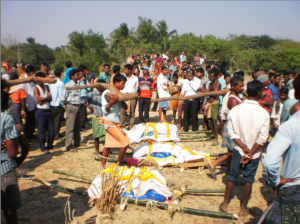 Ignoring the prohibitory orders more than 3000 villagers and leaders of a variety of social movements and political parties gathered in a meeting at Dhinkia to protest the murders and the land grabbing and repression they have suffered this week while still in shock after the bombing. They called for an immediate halt to the land acquisition. The rally was attended by CPI, CPM, Samajwadi party,RJD, Forward Block, Congress, Aam Admi Party, RPI, CPI-ML( Ram Chandra Group) , CPI-ML (Kahnu Sahnyal Group),
Ignoring the prohibitory orders more than 3000 villagers and leaders of a variety of social movements and political parties gathered in a meeting at Dhinkia to protest the murders and the land grabbing and repression they have suffered this week while still in shock after the bombing. They called for an immediate halt to the land acquisition. The rally was attended by CPI, CPM, Samajwadi party,RJD, Forward Block, Congress, Aam Admi Party, RPI, CPI-ML( Ram Chandra Group) , CPI-ML (Kahnu Sahnyal Group),
Jan Badi Lekhaka Sangh, All India Revolutionary Womens Organisation, HAL Bistapita Andolan, Basti Surakshya Mancha. etc.
A number of women dis-robed themselves as a desperate peaceful protest against the brutal repression and war waged on their villages. Many women were beaten with sticks by the police and more than 60 were injured in total. These pictures from an Odiya newspaper tell part of the story:
PPSS Spokesman Prashant Paikary issued this statement from the rally:
“Today (6th March 2013) in an unprecedented manner our villagers took a resolve not to allow further demolition of betel vines and forcible land acquisition from 7th March 2013. Men, women and children unanimously took a pledge to go to the sites where armed police make attempt to destroy the bread and butter belts of the village and oppose their brute force at any cost. Since no dissent and democratic opposition is having any impact and the state is ignoring all forces, our people have taken a resolve to very firmly and quite peacefully continue the protest. If our protest fails, the women have decided to take over and run the protest keeping the situation in mind. We urge upon all concerned citizens, friends and co-fighters to please come and be with us in such a difficult time where the governments of the day have been completely sold out to a private company and their hired goons which necessarily include the police and administration.”
A group of South Korean Trade Unions and human rights organisations have also issued a statement demanding that POSCO and the Korean government take responsibility for the the killings and land grabbing and put a stop to the project.
Slogans of the anti-Posco movement in Odiya and English:
